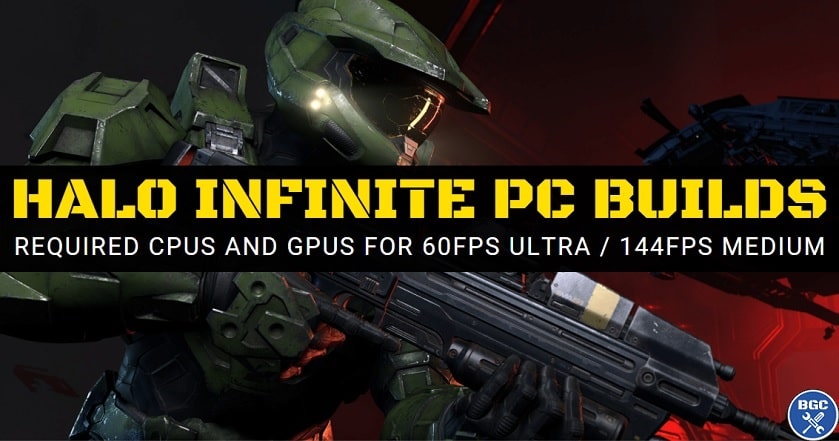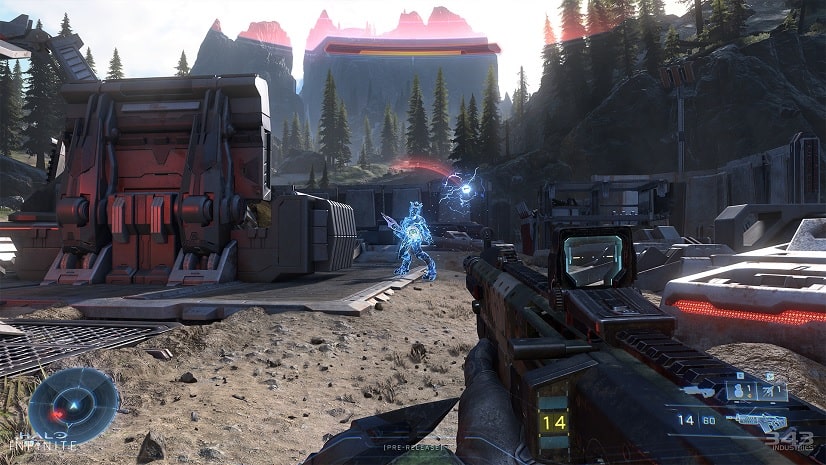Home > PC Builds > Halo Infinite
Build the Best PC for Halo Infinite
Hardware Requirements & Recommended CPUs/GPUs for 60FPS (1080p, 1440p, 4K)

Last Updated: January 12, 2022
The immortal sci-fi series is back in style, with Halo Infinite recently launching with a lot of positive reactions to both its single player campaign and multiplayer. If you're upgrading or building a PC and want to ensure good performance in Halo Infinite, I've studied various benchmarks and condensed what you need to know to get smooth performance for your particular resolution and settings.
Benchmarks researched to base the following hardware recommendations off were a mix of both single and multiplayer, in order to give a general overview of which components you'll need no matter which mode you're playing. Though keep in mind that performance in multiplayer can vary a lot, so if you primarily play that then take these recommendations as more ballpark estimates.
Overall, Halo Infinite is a very demanding game on PC, and that immediately shows through in the fairly high official minimum requirements (which we'll get to next). It's a very GPU demanding game, but also a relatively CPU intensive one as well, though definitely more GPU-bound with even 1080p resolution requiring quite a strong graphics card to get high frame rates.
Related: Build the Best PC for Battlefield 2042
Halo Infinite Official Requirements
Before getting into hardware recommendations, as always let's first quickly discuss the official minimum requirements as listed on Steam. There's nothing of note to say about the modest minimum requirements, but the recommended requirements are fairly beefy. Relative to most PC titles, having a strong CPU and GPU like a 3700X/9700K and 5700XT/2070 listed within the official recommended specs is a fairly high bar, and hints at the game's demanding nature on both the GPU and CPU.
Minimum PC Requirements
- CPU/Processor: AMD Ryzen 5 1600 or Intel Core i5-4440
- GPU: AMD Radeon RX 570 or NVidia GeForce GTX 1050 Ti
- RAM/Memory: 8GB
- Disk Space: 50GB
- Operating System: Windows 10 64-Bit
Recommended PC Specs
- CPU/Processor: AMD Ryzen 7 3700X or Intel Core i7-9700K
- GPU: AMD Radeon RX 5700 XT or NVidia GeForce RTX 2070
- RAM/Memory: 16GB
- Disk Space: 50GB
- Operating System: Windows 10 64-Bit
While these official recommended specs are quite high, you'll have a solid experience at 1080p with this sort of setup. Meaning that there's no real need to get anything stronger than this, assuming you're using a 1080p monitor and also assuming you're willing to tone down the settings.
You won't hit 60FPS consistently on maxed settings with the above specs. Now let's get into specific requirements for butter smooth 60FPS performance on either medium or ultra settings, and finishing off with what you'd need if aiming for an audacious 144FPS on 144Hz displays - unlike many other shooters, reaching over 100FPS and beyond in Halo Infinite is very hard and requires serious bankroll.
Related: PC Gaming Resolutions Explained

Best Budget PC Builds for Halo Infinite (1080p 60Hz)
As KitGuru mentioned in their Halo Infinite benchmarks, at ultra settings Halo Infinite is a VRAM hog - even at 1080p resolution. For anyone new to PCs, be mindful not to confuse VRAM with general system RAM. VRAM (Video Memory) is the memory found on the graphics card itself.
Tests show that at 1080p Ultra, you can see up to a whopping 8GB of VRAM being allocated depending on the section of the game (on GPUs that have that amount of VRAM or more). This simply means that GPUs with less than 8GB of VRAM will struggle at 1080p Ultra, and you'll likely need to really tone down those graphics settings on mid-range GPUs that have 6GB of VRAM or less (if you want great performance that is).
Speaking of which, if you want to run the game on medium settings at 1080p and get near 60FPS, based on multiple benchmarks I've seen the cheapest modern GPUs I can suggest are the Radeon RX 5600 XT or GeForce GTX 1660 Super, with performance tests showing either hitting around 50-60FPS on average.
Halo Infinite Recommended Specs for 1080p 60FPS
CPU: Intel Core i5 12400 / 11400 / 10400 / 11400 or AMD Ryzen 3 3300X / Ryzen 5 3600 / 3600X
GPU (MEDIUM): AMD Radeon RX 6500 XT / RX 5600 XT or NVidia GeForce RTX 3050 8GB / GTX 1660 Super 6GB / RTX 2060 6GB
GPU (ULTRA): AMD Radeon RX 6600 XT 8GB or NVidia GeForce RTX 3060 Ti 8GB
RAM: 16GB 3200MHz DDR4 (2x8GB)
If you do want those ultra settings to experience the highest level of visual fidelity, to hit an average around 60FPS or thereabouts in most areas of the game on maxed settings you need to step things up to a RX 6600 or RTX 3060, both of which have that nice 8GB of VRAM to take full advantage of ultra settings (the RTX 3060 also comes in 12GB models too, which gives you plenty of headroom for VRAM-hungry titles like this, as well as being more suited for 1440p compared to its 8GB variant since higher resolutions use more VRAM).
These are the best value graphics cards for 1080p Ultra, though they'll definitely dip under 60FPS in many areas of Halo Infinite, so if you're a performance snob wanting to avoid all frame drops for a flawless experience, and with some headroom to take into account the performance discrepancies when it comes to multiplayer, you'll want a RTX 3060 Ti or RX 6600 XT (or better).
Best PC Builds for Halo Infinite (1440p/4K 60Hz)
Halo Infinite is an AMD sponsored game, which explains why it doesn't support NVidia DLSS. Though it doesn't support AMD's competing feature either (AMD FSR). Without these performance enhancing features, at high resolutions like 1440p and 4K you and your poor GPU are on your own out there. Halo Infinite is very demanding on the GPU at such high pixel counts, so without a top-tier card you can kiss 60FPS at ultra settings goodbye. If you don't mind medium settings, or even high settings if you're okay with a potential average under 50FPS, a RX 6600 or RTX 3060 will get the job done for an okay 1440p experience on a budget. For the best 1440p setup, you'll need a more powerful card.
Halo Infinite Recommended Specs for 1440p 60FPS
CPU: Intel Core i5 12400 / 11400 / 10400 / 11400 or AMD Ryzen 3 3300X / Ryzen 5 3600 / 3600X
GPU (MEDIUM): AMD Radeon RX 6600 8GB or NVidia GeForce RTX 3060 8GB/12GB
GPU (ULTRA): AMD Radeon RX 6700 XT 12GB or NVidia GeForce RTX 3070 8GB
RAM: 16GB 3200MHz DDR4 (2x8GB)
At 4K, GPU requirements obviously go through the roof for such a GPU demanding game like Halo Infinite. CPU recommendations remain the same as per the 1080p and 1440p 60Hz recommendations, as higher resolutions place more demand on the GPU (and not the CPU). Put another way, if a certain CPU can hit 60FPS at 1080p, it's also totally fine to use for 4K 60FPS gaming.
Halo Infinite Recommended Specs for 4K 60FPS
CPU: Intel Core i5 12400 / 11400 / 10400 / 11400 or AMD Ryzen 3 3300X / Ryzen 5 3600 / 3600X
GPU (MEDIUM): AMD Radeon RX 6700 XT 12GB or NVidia GeForce RTX 3070 8GB
GPU (ULTRA): AMD Radeon RX 6800 XT 16GB or NVidia GeForce RTX 3080 10GB
RAM: 16GB 3200MHz DDR4 (2x8GB)
Ultimate PC Builds for Halo Infinite (144Hz)
Unlike many other shooters on the market, achieving such high frame rates as 144FPS to take advantage of that 144Hz screen is a tough ask in Halo Infinite. If you have a 144Hz monitor, you'll want to tone down the settings without a doubt. No GPU on the market today can reach 144FPS in Halo Infinite on maxed settings - nope, not even at measly old 1080p, with the kidney-priced king of GPUs (RTX 3090) paired with a high-end CPU only pushing around 100 to 120FPS at 1080p Ultra.
Halo Infinite is also quite CPU intensive, so reaching high frame rates requires a very capable processor too. Just remember, as explained in detail in the CPU bottlenecks guide, you don't need a faster CPU for higher resolutions, but for higher refresh rates like 144Hz (ie frame rates), you most certainly do. The best value high-end gaming CPUs right now are the 12600K and 5600X, which are capable of hitting 144FPS in Halo Infinite assuming your GPU checks out for your resolution. I've left out cutting edge 4K 144Hz monitors as it's not a feasible combination of resolution and refresh rate for such a GPU intensive game.
Halo Infinite Recommended Specs for 144FPS (MEDIUM/HIGH)
CPU: Intel Core i7 12700K / i5 12600K or AMD Ryzen 7 5800X / Ryzen 9 5900X
GPU (1080p): AMD Radeon RX 6800 XT 16GB or NVidia GeForce RTX 3080 10GB
GPU (1440p): AMD Radeon RX 6900 XT 16GB or NVidia GeForce RTX 3090 24GB
RAM: 32GB 3600MHz DDR4 (2x16GB or 4x8GB)
Lastly, judging from multiple benchmarks and reports out there, AMD cards seem to have a slight edge in this particular title, providing slightly higher performance than NVidia. The game is an AMD sponsored one after all, so it makes sense that their cards end up being the slightly more optimized ones (at least at this moment, and future updates to the game may even things out).
So I would slightly favor AMD cards if you want the absolute best performance in this particular title, but the performance differences aren't huge so it's not going to matter much. Anyway that wraps my thoughts on choosing optimal hardware and building the best PC for Halo Infinite. Good luck and GG.
See Also: The Best Gaming Monitors
Value CPUs of the Month (Feb 2025)
- Intel Core i5 12400F (6 Core)
- AMD Ryzen 5 7600X (6 Core)
- AMD Ryzen 7 7800X3D (8 Core)
Trusted VPN
VPN software can be important in this day and age, especially if you do lots of online banking and/or use public WiFi whilst travelling. Having a VPN adds an extra layer of security to your PC or laptop to help protect your details such as financials, banking activity, etc. There are also benefits to using VPNs for gaming.
Because they're so popular these days, there are countless VPN providers, and it can be confusing to pick one. If you want my 2 cents, after a lot of research I decided on NordVPN 'cause it's one of the fastest, most reliable VPNs for both gaming and general use, with a lot of credible reviews out there backing that up. They also quite often run very solid deals.
Popular Articles
Value GPUs of the Month (Feb 2025)
- Gigabyte Radeon RX 7600 XT Gaming OC (16GB)
- Gigabyte Radeon RX 7800 XT Gaming OC (16GB)
- ASUS GeForce RTX 3060 Dual V2 OC (12GB)
Search the Site
About Me (2025 Update)
I'm an indie game developer currently developing my first public release, an immersive VR spy shooter with sci-fi themes set to release on Steam, partly inspired by the likes of Perfect Dark, MGS2, HL2, Splinter Cell, and Deus Ex. Researching, writing, and updating this site helps a little with self-funding the game, as I earn a few dollars here and there from Amazon's affiliate program (if you click an Amazon link on this site and buy something, I get a tiny cut of the total sale, at no extra cost to you).
I hope the site helps save you money or frustration when building a new PC, and makes your PC building journey easier and more fun. If you want to support the countless hours that's gone into creating and maintaining the site, besides using my Amazon links if purchasing something, sharing an article on socials or Reddit does help out and is much appreciated. I also accept coffee.

